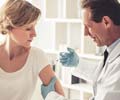Researchers have found that parents accessing website that contains reliable information about the measles, mumps and rubella (MMR) vaccine can be the most cost-effective way.

Now the experts are recommending that a similar website be developed as part of NHS guidelines on the MMR vaccine.
Dr Sandy Tubeuf, a health economist in the School of Medicine at the University of Leeds, was part of the research team. She said: "This research offers a really simple solution that would make a real difference to vaccination uptake and to the NHS budget. This research has shown considerable cost effectiveness to the NHS, and is much more convenient for parents who need more information about the safety of the MMR vaccine for their children.
"This information should be made available at the click of a mouse or the swipe of a finger, as we have shown that it also helps to improve vaccine uptake."
In the study, funded by the National Institute for Health Research, 179 first-time parents whose children were offered the vaccine for the first time were split into three groups: those who had a visit to their GP plus logon details to the website by post, those who had a visit to the GP plus an information leaflet, or those who just had a GP appointment. They were recruited from GP surgeries across the north of England.
Parents were contacted when they were recruited for the study and sent a questionnaire. A second questionnaire was sent two weeks after the first, to enable the researchers to collect data for the economic evaluation.
Advertisement
Advertisement














